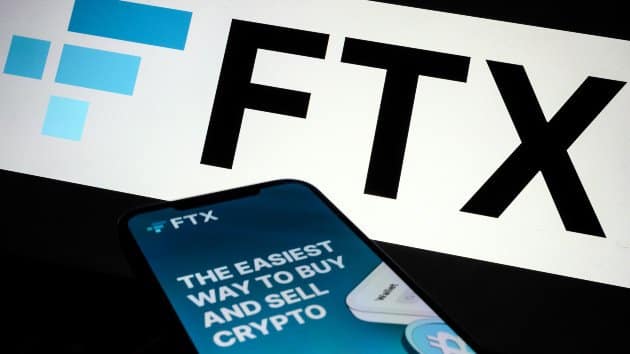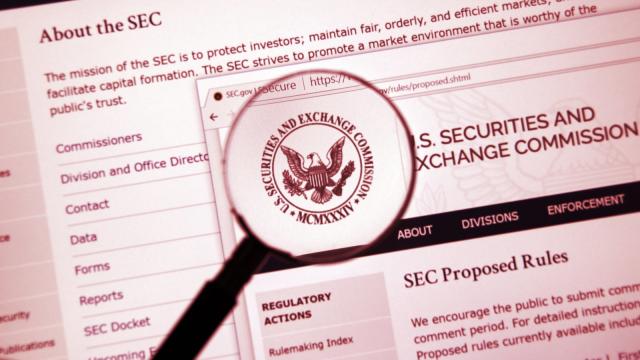Business
Crypto Exchange FTX Collapses, Files for Bankruptcy

FTX took less than a week to go from the world’s third-largest cryptocurrency exchange to bankruptcy. The embattled cryptocurrency exchange sought bankruptcy protection.
On Friday morning, FTX, the hedge fund Alameda Research, and dozens of other affiliated companies filed for bankruptcy in Delaware. FTX US, which was not expected to be part of any financial rescue, was also included in the company’s bankruptcy filing.
According to the company, CEO and founder Sam Bankman-Fried has resigned. Bankman-net Fried’s worth was recently estimated to be $23 billion, and he has been a major political donor to Democrats. According to Forbes and Bloomberg, which closely track the net worth of the world’s richest people, his net worth has vanished.
“I was shocked to see things unravel the way they did earlier this week,” Bankman-Fried wrote on Twitter.
The unravelling of FTX is causing ripple effects. Companies that backed FTX are already writing down their investments. Politicians and regulators are increasing their calls for stricter regulation of the cryptocurrency industry.
And the latest crisis has put downward pressure on bitcoin and other digital currency prices. According to CoinMarketCap.com, the total market value of all digital currencies fell by about $150 billion in the last week.
The failure of FTX extends beyond finance. The company also had major sports sponsorships, such as Formula One racing and a deal with Major League Baseball. Miami-Dade County decided to end its relationship with FTX on Friday, which means the venue where the Miami Heat play will no longer be known as FTX Arena.
Mercedes announced that FTX would be removed from its race cars this weekend.
Semafor, the high-profile news startup run by former BuzzFeed editor-in-chief and New York Times columnist Ben Smith, was also an early investor for FTX and Bankman-Fried, as well as his brother.
 SEC Investigating FXT
SEC Investigating FXT
Bankman-Fried also has other issues. According to a person familiar with the situation, the Department of Justice and the Securities and Exchange Commission are investigating FTX to determine whether any criminal activity or securities violations occurred. The person could not speak publicly about the investigations and spoke to The Associated Press on the condition of anonymity.
The inquiry is focused on the possibility that FTX used customer deposits to fund bets at Alameda Research. Brokers in traditional markets are expected to keep client funds separate from other company assets. Regulators have the authority to penalize violations. When MF Global intermingled client assets with its own bets roughly a decade ago, it effectively failed for a similar practice.
FTX listed more than 130 affiliated companies worldwide in its bankruptcy filing. The company estimated its assets to be worth $10 billion to $50 billion and its liabilities to be worth the same amount. The company named John Ray III as its new CEO, a long-time bankruptcy litigator best known for having to clean up the mess left by Enron’s demise.
The bankruptcy of FTX will undoubtedly be one of the most complicated bankruptcy cases in recent years. According to bankruptcy lawyers, the company listed more than 100,000 creditors in its filing, and because all of its customers are effectively creditors because they deposited their funds with FTX, determining who is owed what will take months.
Cryptocurrency Not Protected
Cryptocurrencies are not legally protected, and politicians on both sides have issued statements opposing any Lehman Brothers-style bailout for cryptocurrency investors.
“Unlike in a case where there is (security insurance in the case of a brokerage failure) or where the FDIC steps in with a bank failure, these customers are completely exposed,” said Daniel Besikof, a partner at Loeb & Loeb LLP, specializes in bankruptcy law.
After experiencing the cryptocurrency equivalent of a bank run, FTX agreed earlier this week to sell itself to larger rival Binance. Customers abandoned the exchange after becoming concerned about FTX’s capital.
The cryptocurrency community had hoped that Binance, the world’s largest cryptocurrency exchange, would be able to save FTX and its depositors. However, after reviewing FTX’s books, Binance concluded that the smaller exchange’s problems were too large to solve and backed out of the deal.
FTX is the latest in a string of disasters rocking the crypto industry, which is now under intense pressure from collapsing prices and circling financial regulators. Its failure is already being felt across the cryptocurrency universe.
Sequoia Capital, a venture capital firm, announced Thursday that it is writing down its total investment in FTX of nearly $215 million.
 Bitcoin price drop
Bitcoin price drop
BlockFi, a cryptocurrency lender, announced late Thursday on Twitter that it is “unable to conduct business as usual” and has paused client withdrawals due to FTX’s demise.
BlockFi, bailed out by Bankman-FTX Fried’s early last summer, said it was “shocked and dismayed” by the news about FTX and Alameda in a letter posted late Thursday on its Twitter profile.
The company concluded by stating that future updates on its status “will be less frequent than what our clients and other stakeholders are accustomed to.”
Bitcoin fell immediately after the letter was published and is now trading below $17,000. Bitcoin, the original cryptocurrency, had been hovering around $20,000 for months before FTX’s problems were revealed this week, sending it briefly down to around $15,500.
Shares of Coinbase, a publicly traded cryptocurrency exchange, and Robinhood, an online trading platform, rose nearly 12%.
Meanwhile, institutional investors were already turning against cryptocurrencies before this week. Sam Bankman-FTX.com Fried’s abrupt demise may have permanently harmed their chances of inclusion in mainstream portfolios.
While there are still many industry zealots, many professional money managers believe the case for cryptocurrency as a portfolio diversifier or digital gold has been debunked. They claim that the losses are too great and the market structure is too risky.
“It has become clear that it will not find a home in institutional asset allocation,” Hani Redha, multi-asset portfolio manager at Pinebridge Investments in London, said. “There was a time when it was regarded as a potential asset class that every investor should include in their strategic asset allocation, and that is no longer the case.”
Tiger Global and SoftBank are facing new FTX losses.
The recent explosions and scandals have demolished the key arguments of crypto supporters, effectively erasing the notion of Bitcoin as a safe haven in turbulent times. But none of those events, from the TerraUSD collapse to the Celsius bankruptcy, were as damning as the discovery that even FTX, once considered one of the most reliable names in crypto, was insolvent.
Salman Ahmed, the chief investment strategist at Fidelity International, which manages $646 billion from London, said the FTX collapse is “raising questions about the viability of the crypto ecosystem.” “It was always difficult to make a case for including crypto, but the setup has come under increased scrutiny.”
In February, his firm launched a Bitcoin exchange-traded product aimed at professional European investors. Since its inception, it has lost approximately 55% of its value.
Only a year ago, cryptomania was at its peak, with Bitcoin reaching $67,000. Bridgewater estimated in January that institutional investors owned 5% of Bitcoin.
Back then, frothy predictions were everywhere. JPMorgan Chase & Co. strategist Nikolaos Panigirtzoglou wrote that Bitcoin could theoretically reach $146,000 in the long run by crowding out gold. According to a PWC survey conducted in April, 42% of crypto hedge funds expect Bitcoin to trade between $75,000 and $100,000 by the end of 2022.
Investors’ perspectives are becoming more restrained. In a recent report, Panigirtzoglou predicted that Bitcoin would return to its summer lows of $13,000. On Friday, Bitcoin was trading below $17,000.
“The argument for investing in cryptocurrency for diversification died a long time ago,” he said in an interview.
Bitcoin has previously crashed and recovered. Some believers believe market hubris is being flushed out, putting the industry on a path to maturity. According to Mike Cyprys, an analyst at Morgan Stanley, FTX’s problems may benefit established companies with a track record of risk management, such as the Nasdaq Stock Market and CBOE Global Markets Inc.
According to Mark Dowding, chief investment officer at BlueBay Asset Management, the case for Bitcoin becoming a digital gold version is bogus. He believes it’s only time before more investors flee and crypto prices plummet.
“It should have been obvious that an industry that was producing nothing, burning cash, and promising alluring returns was doomed to fail,” he said.
VOR News, Bloomberg, AP
Business
Tesla Stock Tumbles After Its Profit Plunged

Telsa second-quarter profit fell more than 40% from the previous year as the electric car business faced more EV competition from established automakers and a slowing in global EV sales growth.
The decline in income is a dramatic contrast to a corporation that developed to become the world’s most valuable automobile based on rising sales and profitability.
The findings highlight how Tesla, a pioneer in introducing electric vehicles to American drivers, is now facing more domestic and international competition. And as the EV market matures, customer interest in EVs has declined.

Tesla | Auto Guide
Tesla Stock Tumbles After Its Profit Plunged
Tesla (TSLA) shares plunged almost 12% on Wednesday morning, pushing down the broader market. Tesla’s stock was down roughly 1% this year through Tuesday’s close after plunging as much as 44% earlier in the year.
Tesla announced adjusted earnings of $1.8 billion in the quarter or 52 cents per share. Analysts expected 61 cents per share earnings, down from 91 cents the previous year. Its crucial profit margin fell substantially as a series of EV price cuts took its toll.
From April to June, the company had its second consecutive quarter of year-over-year sales decreases and its first consecutive quarter of dropping sales volume. Tesla’s only previous quarterly sales decline since going public occurred early in the pandemic when stay-at-home orders caused its plants to close.
Tesla did not provide a new sales target for the full year. However, it stated: “In 2024, our vehicle volume growth rate may be notably lower than the growth rate achieved in 2023.”
On the investor’s call following the announcement, Tesla CEO Elon Musk criticized the quality of EVs produced by other manufacturers, claiming that it was simply a short-term issue for Tesla and not a long-term one. He added that Tesla is still persuaded that the world is going towards fully electric transportation systems, not just for automobiles, planes, and ships.
Musk also stated that the business would provide more information on fully automated robotaxis in October rather than August as initially intended. The business calls its driver assistance feature “Full Self Driving,” but drivers must still be prepared to take control of the vehicle. According to the company’s earnings statement, Tesla still confronts regulatory and technical challenges before offering self-driving cars.
Musk stated that he still believes it is possible to reach by the end of this year and certainly by next year, but cautioned: “My predictions on this have been overly optimistic in the past.”

Tesla | Top Gear Image
Tesla Stock Tumbles After Its Profit Plunged
The company faces government probes into several of Musk’s boasts about Full Self-Driving capabilities. The company has also been the subject of a Department of Justice investigation, though it is unclear what the current situation is.
However, he disclosed that Tesla’s plans to build an assembly factory in Mexico had been placed on hold. The plans were disclosed more than a year ago, but Musk said they have been halted until after the presidential election due to Republican contender Donald Trump’s vow to impose taxes on Mexican-imported vehicles. Musk is a big Trump booster, having endorsed him and reportedly pledged tens of millions of dollars to the former president’s re-election campaign. Trump promised comparable duties on Mexican-made autos in 2019 but has yet to follow through.
SOURCE – CNN
Business
Bitcoin Surpasses $67,000 in Anticipation of Trump’s Keynote Address.

(VOR News) – Over the Bitcoin course of the last twenty-four hours, the sum of money that has been liquidated in short positions for Bitcoin BTC +4.71% has increased to more than $34 million.
This is a significant increase from the previous state of affairs. The fact that Bitcoin, the digital asset with the highest market capitalisation, has broken beyond the barrier of $67,000 is the reason for this new development.
Nashville, Tennessee will host this year’s Bitcoin Conference.
According to the website of the conference, the former president of the United States is set to make an appearance on the Nakamoto Stage on July 27 at 2:00 p.m. Central Time for a session that will last thirty minutes.
This information is indicated on the website. Yesterday, on the final day of the conference, the session is scheduled to take place.
As a direct result of the increase in the price of bitcoin that took place during the course of the previous day, a total of holdings representing a value of 54 million dollars were sold off.
As a consequence of the increased volatility of the market, the cryptocurrency market as a whole went through liquidations that amounted to more than two hundred million dollars within the same time period. This is evidenced by the data that were provided by Coinglass.
The information that is provided by The Block’s Bitcoin Price Page reveals that the current value of Bitcoin is around $67,330 at the time that this article is being written and published.
This information is provided by The Block. Over the course of the past twenty-four hours, there has been an increase that is greater than five percent.
President Trump will invest in bitcoin by 2024.
Because of the keynote presentation that he will deliver at Bitcoin 2024, Donald Trump will create history by becoming the first candidate for the presidency of the United States of America to visit a conference of this kind that is sponsored by the industry.
This will be something that he will accomplish by attending Bitcoin 2024. In spite of the fact that there is a little amount of information available concerning the specifics of his discussion, the organisers have already claimed that it will be “historic.”
Throughout the course of his presidency, President Trump has adopted a variety of perspectives about a wide range of cryptocurrencies, including bitcoin and others from the same category.
He voiced his disapproval of cryptocurrencies on Twitter in July 2019, saying, “I am not a fan of bitcoin and other cryptocurrencies, which are not money and whose value is highly volatile and based on thin air.”
He was referring to the fact that certain cryptocurrencies are not money. His hatred for these cryptocurrencies has been made clear in his statements.
Specifically, he expressed his discontent with the bitcoin market.
Which was the subject of his expression. This viewpoint was reiterated by him in 2021, when he gave an interview to Fox Business in which he referred to the digital asset as a hoax and voiced his concern that it may compete with the United States dollar or other currencies. In addition, he expressed his concern that it could be used to compete with other currencies.
Nevertheless, throughout the course of the last six months, Trump has rebuilt himself as the “crypto president.” The fact that he chose Ohio Senator JD Vance, who is an investor in bitcoin, to be his vice presidential candidate lends credence to the notion that a Donald Trump presidency may be advantageous to cryptocurrencies.
This is an extra point of interest that is worth mentioning. Bitcoin is an investment that Vance has made.
During the course of the previous day, the dominance of Bitcoin increased slightly to 52.8%, as indicated by the data that were provided by Coingecko. On the other hand, the dominance of ether decreased slightly to 15.5%.
Indicative of the fact that Bitcoin’s dominance rose, both of these data are indicative of reality. After reaching its highest position, the GM 30 Index, which is comprised of a selection of the top 30 cryptocurrencies, witnessed a climb of 3.08% within the same time period, hitting 133.99.
This was after the index had reached its highest peak.
SOURCE: TBN
SEE ALSO:
Sanstar Stock Gains after Listing: Should you Buy, Sell, or Hold?
MMTC’s Shares Surge 20% to Reach a One-Year High; What’s Ahead for This PSU Stock?
Tesla’s Stock is Down due to the Ongoing Decline in Profits.
Business
Sanstar Stock Gains after Listing: Should you Buy, Sell, or Hold?

(VOR News) – Sanstar shares made a quiet Dalal Street debut on Friday, which was less than market participants had anticipated as a consequence of their expectations.
However, the number of buyers rose significantly following the stock’s listing, suggesting that investors are interested in purchasing the company at reduced prices.
At Rs 109 per share, Sanstar shares were offered on the National Stock Exchange (NSE) at a premium of approximately 15%. The stock was listed on the Bombay Stock Exchange (BSE) at a premium of 12 percent over the issue price of Rs 95 per share.
Nevertheless, the stock attained a price of Rs 127.68, achieving a 20% upper circuit and bringing the cumulative profits to 34.4 percent over the price at which it was initially issued.
The majority of analysts continue to maintain a positive outlook on the company and suggest that investors remain invested in the stock for a period of time that varies from medium to long term.
On the other hand, there are some experts who suggest that investors record profits after achieving a respectable profit during the initial trading session.
A successful initial public offering (IPO) was achieved by Sanstar
The company’s shares are currently trading at Rs 109 per share, an increase of 15% from their issue price of Rs 95.
This performance is positive, according to Shivani Nyati, Head of Wealth at Swastika Investmart; however, it fails to satisfy the expectations that were established prior to the listing. The broader market volatility that ensued subsequent to the budget’s announcement was a contributing factor.
Sanstar has been listed, which is a fantastic development, despite the fact that it did not meet the initial hype.
The company’s future expansion is supported by the interest of investors and the company’s robust foundations. Investors have the option to maintain their stake at the issue price, according to her.
Sanstar’s initial public offering (IPO) had the potential to be subscribed between July 19 and July 23, as the business issued its shares at a price range of Rs 90-95 per share, with a lot size of 150 shares.
Sanstar’s follow-on offering yielded a total of Rs 510.15 crore in revenue. This offering comprises a wholly new share sale of up to 397.10 equity shares and an offer-for-sale of up to 1.19 crore equity shares.
Sanstar got a 15% premium because of demand.
Which contributed to the company’s successful launch on the bourses today. According to Prathamesh Masdekar, Research Analyst at StoxBox, Sanstar has established enduring relationships with its consumers and currently serves more than 525 customers, with 162 new customers joining during fiscal year 24.
“The company is committed to expanding its customer base by leveraging the relationships it has established with customers in India and around the world, while simultaneously actively seeking out opportunities to establish new relationships.
“”Because of this, we recommend to the market participants that they keep the shares for a period of time ranging from the medium to the long term,” according to him.
A total of 82.99 subscriptions were received from consumers worldwide for the Sanstar issue. The quota for qualified institutional vendors (QIBs) was satisfied 145.68 times during the auction.
A remarkable 136.50 percent of the quota that was designated for non-institutional investors was subscribed to. The portions that were specified for retail investors were only subject to requests for bids 24.23 times during the three-day bidding procedure.
Sanstar’s listing was lower than anticipated, despite the fact that markets were trending upward. Prashanth Tapse, Senior Vice President of Research at Mehta Equities, maintains that designated investors should record profits on the day of listing, despite the market’s optimistic outlook.
Compared to other listed peers, Sanstar’s valuations are a little higher.
Sanstar is a manufacturer in India that specialises in the manufacturing of plant-based products and ingredient solutions for industrial products, pet food, and food.
Pantomath Capital Advisors served as the exclusive book-running lead manager for Sanstar’s initial public offering (IPO), while Link Intime India served as the registrar.
According to Amit Goel, Co-Founder and Chief Global Strategist at Pace 360, the market volatility in the Indian markets resulted in Sanstar shares failing to meet pre-listing expectations. Sanstar shares were listed on the National Stock Exchange (NSE) at a price of Rs 109.
We strongly recommend that investors take profits in the near term following the completion of the listing. He continues, “It is advised that long-term investors maintain their positions in the company due to its strong fundamentals.”
SOURCE: BTN
SEE ALSO:
MMTC’s Shares Surge 20% to Reach a One-Year High; What’s Ahead for This PSU Stock?
Disney Reaches Tentative Agreement With California Theme Park Workers
Tesla’s Stock is Down due to the Ongoing Decline in Profits.
-
World2 weeks ago
Former President Trump Survives Being Shot at Pennsylvania Rally
-
Tech4 weeks ago
Huawei Launches 5G-A Pioneers Program at MWC Shanghai 2024: Paving the Way for a Connected Future
-
Sports4 weeks ago
NBA Draft: Kyle Filipowski Withdraws Unexpectedly From The First Round
-
Tech4 weeks ago
ChatGPT Answers Undiscovered Questions and Outperforms Students.
-
News4 weeks ago
US Supreme Court Rejects Drug Deal that Protects the Sackler Family
-
Health4 weeks ago
US Health Agency Issues Dengue Virus Infection Warning

 SEC Investigating FXT
SEC Investigating FXT
 Bitcoin price drop
Bitcoin price drop


















